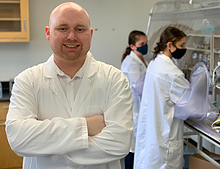Understanding How the Gut Microbiome Influences Human Health

Living inside of every person are trillions of microorganisms—bacteria, viruses, fungi and other life forms that are collectively known as the microbiome. While they are miniscule in size, this collection of microbes has a big impact on our health.
Brantley Hall, who joined the University of Maryland on July 1 as an assistant professor in the Department of Cell Biology and Molecular Genetics, is particularly interested in the microbiome of the human gut, the region of the gastrointestinal tract that digests food, absorbs nutrients and expels waste.
Based on years of effort by numerous researchers focused on the microbiome, Hall says that scientists have collectively accumulated an acceptable understanding about the species of microbes that inhabit the gastrointestinal tracts of people in the United States.
The next step, he says—and one that will be the focus of his new lab at UMD— is to genetically interrogate the functions that these gut microbes perform, and how those functions interact, both positively and negatively, with human health.
“This is an enormous undertaking,” Hall explains. “There are millions of gut microbial genes lacking functional annotation, and those with functional annotations are of questionable quality.”
Hall says his lab is working to fill that gap by improving functional annotation across gut microbiome species, combining computational and wet-lab techniques to identify genes responsible for health-relevant functions, and developing new strategies to measure the metabolic output of the gut microbiome.
“Our long-term goal is to rationally modulate the human gut microbiome to improve human health,” he says.
Hall, who also has an appointment in the University of Maryland Institute for Advanced Computer Studies (UMIACS), says that coming to UMD seemed like a “very good fit.”
“I was excited about the opportunity to work with researchers at Maryland,” he says. “There is an enormous value in being surrounded by like-minded computational biologists.”
Michael Cummings, a professor of biology and director of Center for Bioinformatics and Computational Biology (CBCB)—one of five major centers that are part of UMIACS—says that Hall is a “very welcome addition” to the Maryland campus.
“Brantley’s interesting and important gut microbiome research is complementary to other research in CBCB, particularly that of [UMIACS director] Mihai Pop,” Cummings says.
Cummings adds that while still early in his career, Hall has proven to be extremely productive as evidenced by his publication record, noting that his research is also impactful, as evidenced by the citations his publications have garnered.
Hall says he has already learned a great deal from his interactions with researchers at CBCB. He cites recent collaborations with Pop and Rob Patro, an associate professor of computer science, as examples.
“By co-advising a graduate student with Mihai, I have been able to draw on his extensive expertise in metagenomic assembly to improve our computational experiments,” Hall says. “And close interactions with genomic software developers such as Rob gives us a better understanding of the state-of-the-art techniques in tool development.”
He adds that UMIACS’ computational resources have already proven beneficial to his research. Specifically, he says his lab is analyzing thousands of metagenomes, which takes a great amount of space to store and a lot of CPU cores to analyze.
“When I was interviewing at UMD, several professors emphasized how great the computing facilities were, and I can now attest that this is true,” Hall says. “Setting up and maintaining these large computing clusters isn't always easy to pull off, and I am grateful for the UMIACS tech support on both the hardware and software.”
—Story by Melissa Brachfeld
